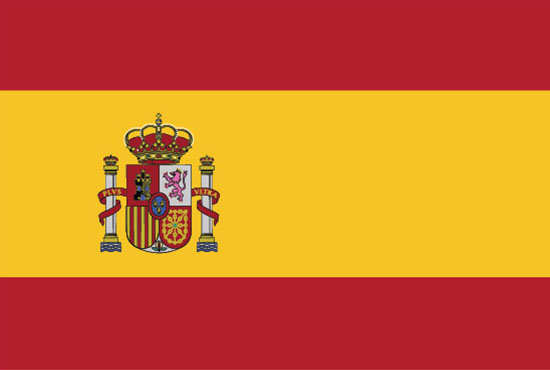Looking for a guide to travel to Spain? If you still do not know what is needed to travel to Spain, we will explain everything you have to prepare for entering and leaving Spain. General information and requirements to travel to Spain with its customs, laws and limitations in the customs of Spain. You have available this travel guide with emergency telephone numbers, the best time to travel to Spain and everything you need to know to travel safely.

SPAIN DATA
| Capital | España (Ver mapa) |
| Languages | Español |
| Moneda | Euro |
| ¿Visa? | No |
| Voltage | 230 volts |
General information of Spain
With the current situation, you may have to fill out some type of form to travel to Spain or covid Spain requirements, so we recommend you check what is needed to travel to Spain or any destination in the country in this travel guide.
To make calls to Spain
To landline: 00 + 34 + nine digits of the phone
To mobile: 00 + 34 + nine digits of the phone
Guide to travel to Spain entry requirements
These are the entry requirements to Spain:
With a passport valid for at least six months, your country’s people can stay for up to a maximum of 90 cumulative days, whether consecutive or not, in a 6-month period. At the end of those 90 days, the person must leave the Schengen Area (common European migration area) for another 90 days before trying to re-enter. It is recommended that you do not exceed the aforementioned period since the immigration authority can expel you and sanction you with the prohibition of entry to the entire European common immigration area.
According to Spanish law, it is mandatory for all people, including tourists, to carry a valid ID; In the case of tourists, they must carry their passport, which may be required by the police authorities at any time.
Return or tourist circuit ticket with closed dates (less than 90 days).
Air tickets open or subject to availability may be an automatic cause of non-admission to Spanish territory.
Justify the reason for the trip and prove sufficient financial means to cover the expenses of the stay.
It is necessary to accredit economic resources for at least 810 euros for the first 9 days plus 90 euros for each subsequent day. The availability of the economic means will be accredited by displaying them, in the event that it is in cash, or by presenting certified checks, traveler’s checks, payment letters, or credit cards, they must be accompanied by the extract of the bank account or an up-to-date bank book (letters from banks or Internet bank statements will not be accepted) or any other means that reliably proves the amount available as credit of the aforementioned card or bank account.
- Lodging supporting document.Supporting document of the existence of a lodging place, either issued by the lodging establishment or an Invitation Letter from an individual previously processed before the corresponding Spanish Police Station, by the person who will give you lodging in Spain, the content of which must respond exclusively to that there is evidence of the existence of certain lodging available to the foreigner, not substituting in any case the accreditation by the foreigner of the other requirements for entry. However, the supporting document of the existence of a place of lodging available to the foreigner will contain the information regarding whether or not the lodging supposes the coverage of all or part of his maintenance. For more information on the requirements, processing and resolution of the invitation letter, you can consult the website of the Spanish Ministry of the Interior.
- Confirmation of the reservation of an organized trip.Transit will be facilitated for your country’s citizens who travel to another country in the Schengen area and who have the corresponding travel verification. In the event that a minor travels alone, it is recommended that they have with them a notarized letter of authorization from their parents. The notarized letter of authorization is also necessary if the minor is traveling in the care of adults other than the father, mother or guardian.
- Important note: The requirements and documents indicated above may be required by the immigration authority, even if the person arrives in Spain only in transit to another country in the Schengen Area. According to the Spanish authorities, in these cases, the person must prove their accommodation by confirming a hotel reservation at the place of destination or, if staying at a private address, proof of the identity and place of accommodation of the person who invites them. .If you do not meet these requirements, you may be subject to inadmission, decreeing an immediate return to your country or the country in which you embarked before trying to enter Spain.
Guide to travel to Spain requirements to leave
Once your stay is over, these are the requirements for leaving Spain:
Upon your departure from Spanish territory, you must present the indicated documentation to the officials responsible for control at the posts authorized for it, for their obligatory verification.
If the documentation is found to be in accordance and there is no prohibition or impediment to the departure of the holder or holders, the exit stamp will be stamped on the passport or travel document.
If the exit is carried out with defective documentation, without documentation or with an identity document on which the exit stamp cannot be affixed, the foreigner will complete, at the police control services, the form provided to record the exit.
Exits from Spanish territory can be carried out freely, except in the cases provided for in the Penal Code (Organic Law 10/1995, of November 23) and in Organic Law 4/2000, of January 11, on the rights and freedoms of foreigners in Spain and their social integration. The departure of foreigners to whom the community regime does not apply may be registered by the Spanish authorities for the purposes of controlling their period of legal stay in Spain in accordance with Organic Law 15/1999, of 13 December, Protection of Personal Data.
Exceptionally, the Minister of the Interior may prohibit leaving Spanish territory for reasons of national security or public health. The instruction and resolution of the prohibition files will always have an individual character.
The exit will be mandatory in the following cases:
Expulsion from Spanish territory by court order, in the cases provided for in the Penal Code.
Expulsion or return agreed by administrative resolution in the cases provided for in Organic Law 4/2000, of January 11.
Administrative denial of requests made by foreigners to continue staying in Spanish territory, or lack of authorization to be in Spain.
Compliance with the term in which a foreign worker would have agreed to return to their country of origin within the framework of a voluntary return program.
Customs information Spain
Drugs of all kinds, including cannabis, are absolutely prohibited.
Do not transport protected animal or plant species.
Regarding the import franchise and tax exemptions, if you come from a country that is not a member of the European Union, you can import merchandise in your personal luggage up to a maximum value of 430 euros in air or sea transport, and 300 euros for other means. Of transport. Children under 15 years of age have a limit of 150 euros, regardless of the means of transport.
There are limitations on the amount of alcohol and tobacco that can be imported.
Beyond the permitted limits, you must spontaneously declare the goods and present yourself at customs to pay the corresponding taxes and fees. Failure to declare may result in confiscation of goods and customs fines.
You must declare the entry and exit of 10,000 euros or more in cash, or its equivalent in other currencies in cash or in easily convertible assets (for example, bonds, shares, traveler’s checks).
For more information, consult the website of the Tax Agency of the Government of Spain.
Local currency of Spain
The legal currency in Spain is the Euro («€», EUR). This is the only currency accepted in shops, restaurants and service stations. Throughout the country there are ATMs that accept different types of cards; the most widely accepted are American Express, Visa, Diners and Mastercard.
The value added tax (VAT) as a general rule is 21%, 10% for food, health, transport and hospitality products, and 4% for products intended for human consumption (including water). If you travel to Spain as a tourist, it is possible to carry out the VAT refund process before your departure. For more information on conditions and requirements, consult the AENA Aeropuertos website.
For more information regarding the local currency or payment methods of the country, consult the section recommendations on money to travel abroad.
Spanish customs
Make sure you know the customs of the country so you can know what is the best time to visit Spain. Here are the most common.
Some of the autonomous regions are characterized by nationalist claims, generally expressed through the use of their language (Catalan, Euzkera, Galician, among others). For this reason, sometimes people may refuse to speak Spanish.
Is it safe to travel to Spain?
Although Spain is a country that does not register high rates of insecurity, recently there have been numerous cases of theft, in which tourists suffer the theft of money and identity documents. In view of the above, certain precautions must be taken to avoid being a victim of theft:
- Always keep your valuables like passport, money, credit cards and other identification in a safe place.
Never carry all your money and cards together.
Always keep your personal and identity objects with you.
It is recommended to have a digitalized copy of your country’s passport and birth certificate in a USB file.
Always keep your suitcases, bags or other personal belongings in sight, especially in places with a large flow of people. - Do not accept help from unknown people or unsolicited help.
- Likewise, always remain attentive and do not neglect your suitcases, bags or other personal objects at any time, especially in places with a large flow of people, such as restaurants, the airport, train stations or public transport during peak hours, since which are spaces in which pickpockets operate most frequently.
Laws in Spain
- Always carry a personal ID with you.
In accordance with Spanish law, it is mandatory for all persons, including tourists, to carry an original valid identification, which may be requested by the police authorities at any time.
Smoking is prohibited in public places (museums, monuments, cinemas), on public transport and inside restaurants and bars. - It is prohibited to drive with a level of pure alcohol in the blood equal to or greater than 0.5 g/l of blood and 0.25 mg/l of expired air. The violation of this rule is sanctioned with a fine, suspension of the driver’s license and even imprisonment.
- Promoting, favoring or facilitating the illegal consumption of toxic drugs, narcotics or psychotropic substances, through acts of manufacture, trafficking or possession is strongly prosecuted and punished. Do not accept to transport packages or orders from unknown people.
Other recommendations in a guide to travel to Spain
- Do not forget to notify your bank that you will travel to Spain, so that they can inform you how to act in case of theft or loss of your credit cards in Spain, or problems that you could have when withdrawing money with your cards abroad.
- Recommendations and more advice by topic or type of traveler, visit the recommendations section for your trip abroad in this guide to travel to Spain.
FAQ (Frequent questions)
What is the official tourism site in Spain?
For general information about Spain, you can consult the website of the Marca España.
For tourist information about Spain, consult the official portal of Tourism of Spain.
What are the emergency telephone numbers in Spain?
112 is the most immediate assistance number in Spain for requests from people who are in a situation of personal or collective risk.
The number 062 is the emergency number to request help from the Civil Guard
091 is the emergency number of the Spanish Police.
112 or 080 Firefighters
112 or 061 Ambulances – medical emergency (SAMU).
What are the mandatory vaccines in Spain?
No specific vaccines are required for tourists to enter Spain. There are also no particular health risks detected in that country.



Leave A Comment